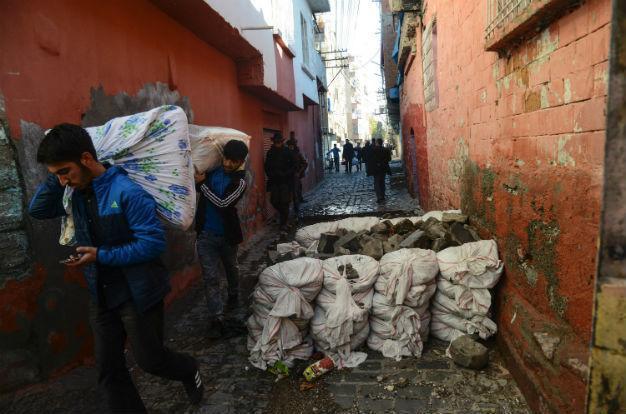Locals flee Diyarbakır’s Sur during break in curfew
DİYARBAKIR

AFP photo
Residents of the Sur district in the southeastern city of Diyarbakır have fled their homes during a short break in a curfew that has been in place for over a week amid clashes between Turkish security forces and the outlawed Kurdistan Workers’ Party (PKK).Fearing fresh clashes, locals started to leave their homes with as many possessions as they could carry in the early hours of Dec. 11 during a brief respite in the curfew that lasted just a few hours.
The curfew, which was imposed on six neighborhoods and a major central street of Sur at 5 a.m. on Dec. 2 was finally lifted at 11 a.m. on Dec. 11, but a new curfew was declared in Sur to go into effect at 4 p.m. on the same same.
Homes, mosques, stores and several other buildings have been badly damaged in the intense clashes that have punctuated the curfews.
The Dec. 2 curfew in Sur came after prominent lawyer Tahir Elçi was shot dead in the town on Nov. 28, in clashes that erupted after gunmen opened fire at police officers nearby, killing two officers.
“We were not able to go outside because of the intense clashes. We ran low on water and food and our homes were damaged,” one Sur resident told the Doğan News Agency.
After a curfew lasting over nine days, Sur has become a warzone-like ghost town, with several buildings on the verge of complete destruction.
During the break in the curfew, boys sifted the ground looking for spent bullets while women sat down and wept at the extent of the damage, the Agence France-Presse reported.
Among those buildings ravaged was the Kurşunlu Mosque, a 500-year-old mosque that was set alight during clashes and is no longer open for use.
Video footage released by Doğan News Agency showed the scale of destruction at the Kurşunlu Mosque, which also previously caught fire on Dec. 6 during clashes between militants and the security forces.
Firefighters at the time were unable to extinguish the fire because of the intensity of the clashes. The mosque is located very close to the scene where Elçi was killed.
The security forces have imposed curfews in many districts across Turkey’s east and southeast in recent months, stating that they are trying to prevent civilian casualties during clashes with PKK militants.
Sur had hit headlines in late November when Elçi was shot dead on Nov. 28 after he delivering a press statement to condemn special forces teams for damaging the base of Diyarbakır’s famous Four-Legged Minaret.
Security forces have yet to conclude whether it was an assassination or whether he was killed in the crossfire during clashes between police and militants.
Diyarbakır Bar Association deputy head Ahmet Özmen, said in a press statement outside a courthouse in Diyarbakır on Dec. 11 that no one had testified as a “suspect” so far as part of the investigation, adding that only police officers have testified as witnesses.
Local and international organizations have demanded that Ankara pursue a comprehensive and transparent investigation into the killing of Elçi.
“It is imperative that the Turkish authorities promptly and effectively investigate the full circumstances behind Elçi’s killing and bring those responsible to justice,” Human Rights Watch stated.
However, Andrew Gardner, the Turkey researcher of Amnesty International, said the investigation “already smacks of a cover up.”
“The circumstances of his killing are far from clear ... the chances of establishing the facts and the identity of the perpetrator(s) appear remote,” Gardner stated.
















